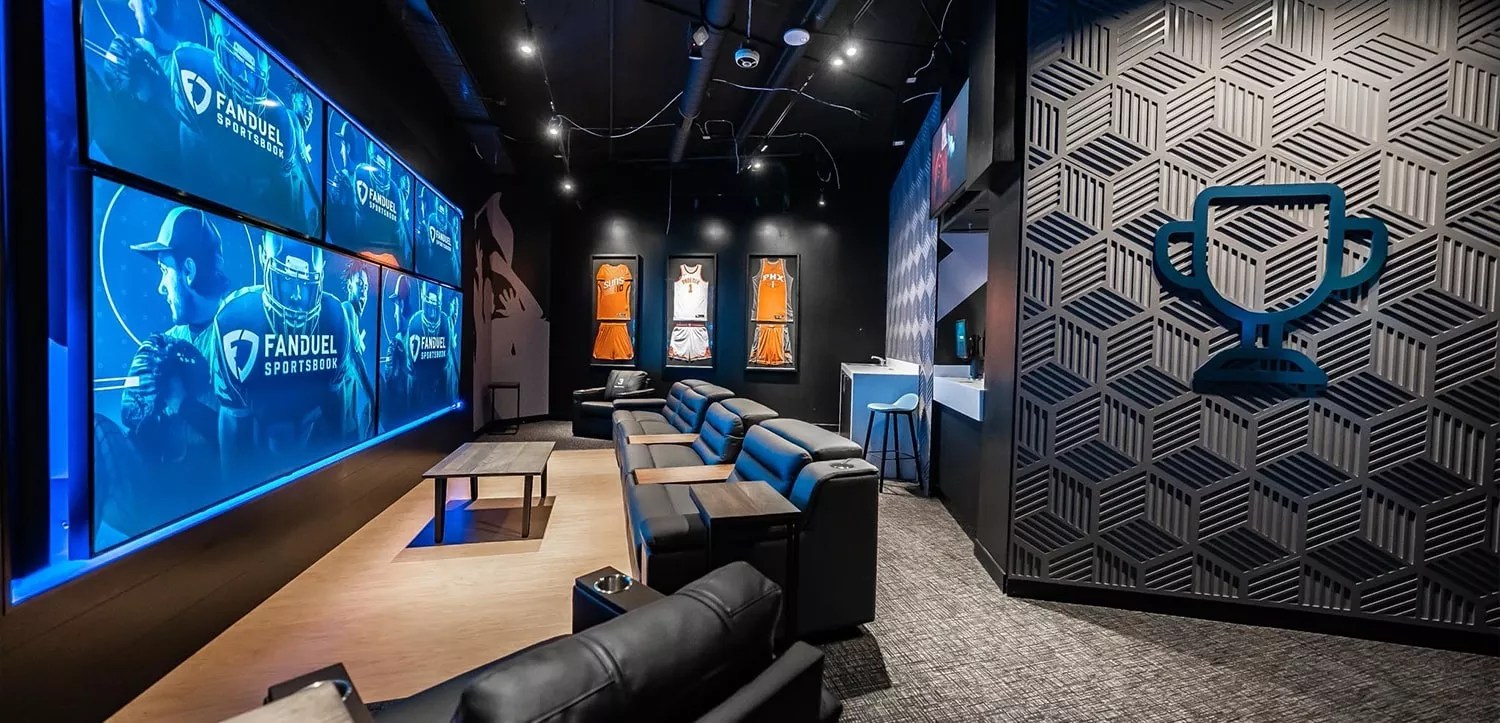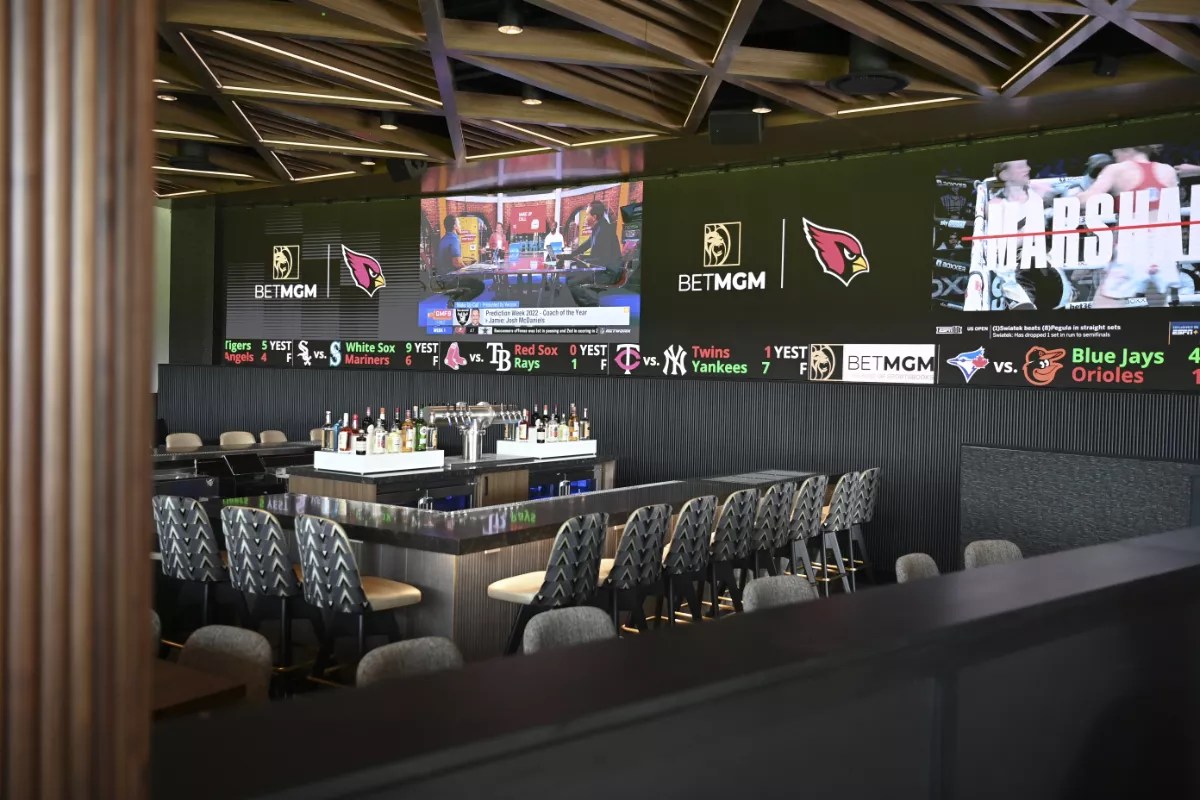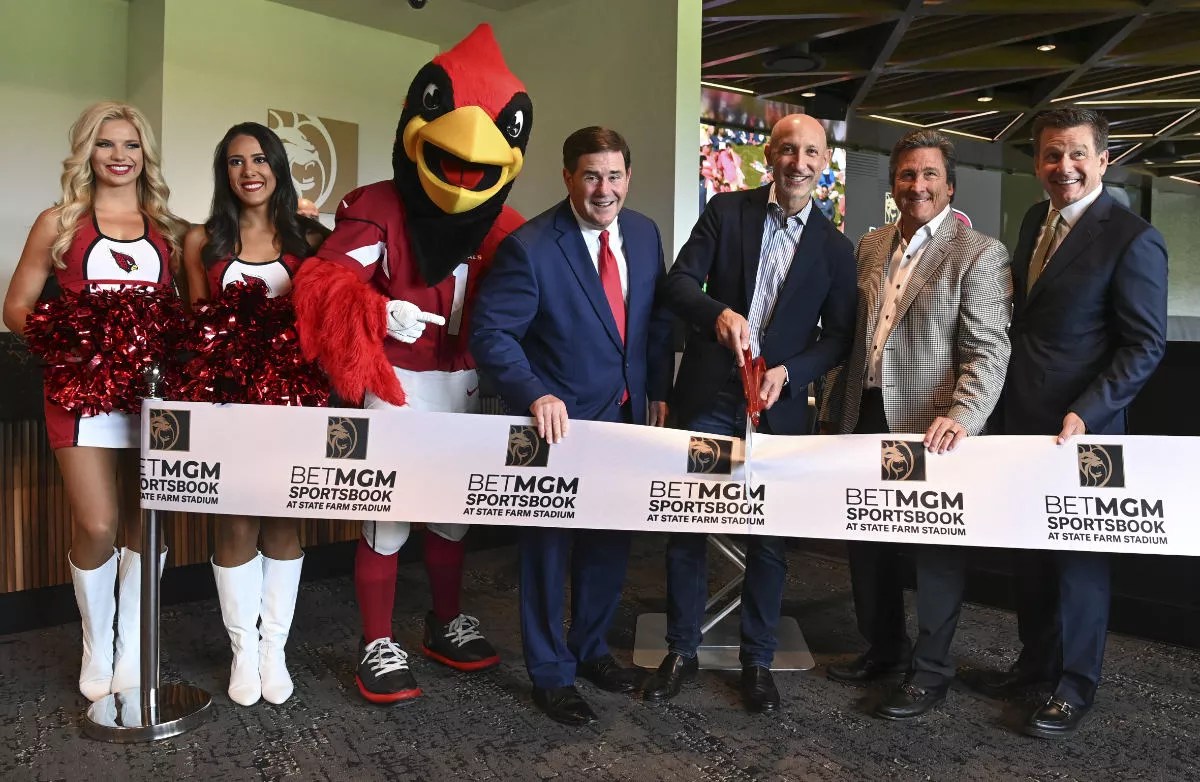
Patrick Faricy/Shannon Associates

Audio By Carbonatix
“Every gambler knows that the secret to survivin’ is knowin’ what to throw away and knowin’ what to keep.”
Kenny Rogers offered that message in his Grammy Award-winning country-western hit, “The Gambler.” It’s a lesson that, nearly 45 years later, regulators in Arizona applied to sports betting – and they learned it well.
On September 9, 2021, event wagering went live in Arizona just five months after Governor Doug Ducey signed a bill legalizing it. Sports betting turned out to be a cash cow, and the state has exceeded expectations at nearly every turn during the activity’s first formative year.
Phoenix has quietly become a national hub for sports gambling thanks to robust fan culture, unique demographics, smart legislation, and a dash of good luck. But there’s a downside, too.
With every bet slip submitted via betting windows, touch-screen kiosks, and millions of mobile phones across the state, Arizona sportsbooks stuff their pockets with the dollars of lovelorn sports bettors – while a paltry tax rate does little to boost the state’s bottom line.

Located directly outside the Footprint Center in downtown Phoenix, the FanDuel Sportsbook features more than 70 cushy seats, 40 television displays, and plenty of betting windows designed specifically for Suns fans.
NBA
Happy Birthday, Bettors!
The 23rd state to legalize live event wagering, Arizona scrambled to become the fastest state to eclipse $1 billion in handle, which is the total number of dollars wagered. It took just 82 days to do so. After one year, Arizona bettors have wagered more than $5 billion, according to the Arizona Department of Gaming.
“Sports betting is here to stay,” Jill Dorson, managing editor of the sports betting industry news outlet Sports Handle, told Phoenix New Times. “In Arizona, it stuck. It really stuck.”
By comparison, Illinois was the second-fastest state to accomplish the $5 billion feat, but it took bettors there 18 months to wager that mighty sum.
Arizona bettors wagered a record $691 million in March, capping the biggest national quarterly handle since the U.S. Supreme Court struck down the Professional and Amateur Sports Protection Act in 2018. During the same month, a single sportsbook – DraftKings – surmounted $1 billion in handle. Sportsbooks are shopfronts or mobile phone applications that gamblers use to place wagers on sports games, horse racing, and other live competitions.
Professional betters told New Times that they try to do better research than the analytics departments at sportsbooks and find bets that are undervalued. That’s sometimes possible during live games when odds might not be updated in real time and they can find a better value for a wager.
That’s the type of strategy employed by Cory Lindover, CEO of The Premium Consulting Group Inc., a pioneering sports betting consulting service based in Ontario, Canada. Lindover styles himself as “an anonymous online celebrity” and went public with his name for the first time in an interview with New Times.
Lindover caters heavily to clients in metro Phoenix, and he noted that Queen Creek was a hot spot in his curation of winning wagers. That’s because the market has emerged as a hub for professional sports bettors.
“I can attest to Arizona being a big sports betting state,” Lindover said. “Arizona is already leading the pack among a lot of states, and it’s positioned to make a really good run in the future.”
But how was the state able to weather a sports scene overshadowed by neighboring California and a gambling market dwarfed by next-door Nevada?
“We find Arizona is a really good sports betting market because of the university presence that Arizona has,” Lindover said. Gamblers ages 21 to 25 make up the bulk of hobby bettors, while professional bettors tend to be much older, which suits a state that consistently ranks among the top destinations for retirees.
Football kicks off at 10 a.m. on the West Coast, and prime-time contests wrap up by 9 p.m. or 10 p.m., Lindover added. That means Arizona bettors are more likely to place more bets on football Sunday than their sleepy East Coast counterparts, who may need a cup of coffee if they want to see how the Arizona Cardinals game ends and still make it to work on Monday morning.
If you’re a bookie, “Arizona is a great space to be in,” Lindover said.
Industry experts all pointed to the breadth of athletic options for fans in Phoenix. including the Cardinals (NFL), Suns (NBA), Diamondbacks (MLB), and Coyotes (NHL). There’s also the Mercury (WNBA), pro soccer’s Phoenix Rising, arena football’s Arizona Rattlers, two major Division I college football and basketball programs at Arizona State University and the University of Arizona, a NASCAR venue, and a PGA Tour stop.

The 265-foot video wall and main bar at the BetMGM Sportsbook at State Farm Stadium.
Caitlyn Epes/Arizona Cardinals
Where the Money Goes
It’s safe to say Arizona is crazy about sports. And fans overwhelmingly prefer to bet on their hometown team, the numbers show.
“Arizona was a little sleeper, but stunningly, here we are passing $5 billion in handle,” Dorson said. “Arizona has become the biggest state in the West for sports betting.”
For the sportsbook operators, that’s great news. Caesars Sportsbook last year became the first operator to launch in a new state on its first day of legalized sports wagering.
“September 9, 2021, was a historic day for our company,” Eric Hession, president of Caesars Digital, said in an email to New Times. “When we look back on this momentous year, we’re encouraged about what lies ahead. Arizona is a state we take pride in.”
Over the past year, Caesars Sportsbook and its competitors doled out $4.7 billion in winning bets to gamblers in Arizona. But with big upsets such as the Phoenix Suns’ Game 7 collapse in May, the industry still raked in a cool $400 million, to the delight of Hession and competitors.
Meanwhile, the industry contributed just $32 million to state coffers in its first year, according to the state gaming agency. Arizona’s tax rate for operators is 10 percent for online wagers and 8 percent for retail bets. In New York, for comparison, the tax rate is 51 percent, according to Front Office Sports. Across the U.S., the average sportsbook tax rate is 19 percent, according to Morgan Stanley.
The average state converts more than one percent of its handle into tax revenue, said Victor Matheson, a professor of sports economics at the College of the Holy Cross in Worcester, Massachusetts. In Arizona, that number is much lower – just a few tenths of a percent.
“Most of that handle is money changing hands without the government getting any of it,” he said.
‘Truly a Historic Event’
Despite a record-smashing inaugural year for sports betting in Arizona, the $32 million the state scraped in is a far cry from early estimates. State Representative Jeff Weninger, a Republican from Chandler, sponsored the legislation greenlighting sports gambling and predicted the move could bring as much as $100 million a year into state coffers.
Unlike in other states, public interest groups in Arizona left the issue well enough alone. As did everyone else, save for a pair of lawsuits last summer.
In August, the Yavapai-Prescott Indian Tribe sued the state and claimed the expansion of gaming through legislative action was unconstitutional. Turf Paradise Racetrack in Phoenix followed suit in late August and argued it was sliced out of the licensing process. Hearings on both lawsuits are slated for this month.
Ducey doesn’t seem to have any qualms about the state’s share of the pie.
“We’ve achieved all of this through a lot of hard work,” Ducey’s spokesperson, C.J. Karamargin, told New Times. “I think the signing of that compact was truly a historic event because it marked the first time in nearly two decades that any changes had been made to the [gambling] law in Arizona. What we’re seeing now are the dividends of that hard work.”
The legislation Ducey signed into law in April 2021 was a compact made up of companion bills from the Arizona House and Senate that allowed for 20 sports betting licenses – 10 to Native American tribes and 10 to professional sports teams. Each license requires a sports betting operator to be involved.
The state could see more cash flow if it issued additional licenses to more Native American tribes, which already dominate contributions to the state gaming department. “Tribal gaming, for example, contributes over $100 million to the state,” said Maxwell Hartgraves, a spokesperson for the state gaming agency. That’s an understatement – reports show tribal gaming contributions totaled more than $123 million between July 1, 2021, and June 30.
Limiting the market to 10 licenses, which Ducey did when he signed the sports betting bill into law, not only takes away potential profits for the state – it could also inhibit tribes from maximizing gambling profits, some industry experts said.
A spokesperson for the National Indian Gaming Commission declined to comment.
Instead of selling the coveted licenses at auction, which could have brought hundreds of millions of dollars into the state treasury, the compact offered the professional sports club owners of metro Phoenix unfettered access to the state’s bookmaking operations.
Campaign finance reports revealed that Alex Maruelo, who owns the Arizona Coyotes, donated about $80,000 to the campaigns of lawmakers who support legislation that would let him open his SaharaBets Sportsbook at the Coyotes’ new arena and entertainment district in Tempe.

Arizona Governor Doug Ducey (center), BetMGM CEO Adam Greenblatt, MGM Resorts CEO Bill Hornbuckle and Arizona Cardinals Owner Michael Bidwill (right) celebrated the official ribbon cutting for the BetMGM Sportsbook at State Farm Stadium in Glendale.
Caitlyn Epes/Arizona Cardinals
Retail Therapy
Arizona is unique in that it allows both mobile betting and in-person retail sports betting. If Maruelo’s efforts bear out, his in-stadium sportsbook would join 25 other brick-and-mortar operations in the state, with a few more already in the works.
Hession said Caesars is mulling a retail sportsbook in its Harrah’s Ak-Chin resort in South Phoenix. A DraftKings Sportsbook at TPC Scottsdale and a BetMGM Sportsbook at Gila River Santan Mountain Casino are expected to open in the fall of 2023. A Barstool Sportsbook at Phoenix Raceway has been rumored, but there hasn’t been an official announcement just yet.
Of the $691 million handle in March, just $3.3 million came from betting windows, according to the gaming department. But gambling gurus advise not to judge the impact of retail sportsbooks on the numbers alone.
“Instead of going to get a hot dog, fans will be making a half-time adjustment,” Lindover said. “Seeing the game and betting in person, seeing the players in real-time, the crowd reaction … there is tremendous value in offering that, and Arizona was the first state to figure that out.”
Dorson said it’s “definitely a unique experience” to bet live, adding that “it allows fans to see what sports betting is really like.”
Maybe that’s why the state has catapulted from 270,000 active bettors last year to an estimated 2 million today, according to numbers from Nielsen.
Flanked by Ducey and mascot Big Red, the Cardinals and BetMGM made history on the first day of the NFL season – and 364 days after sports betting went live in Arizona. Dignitaries debuted the first sportsbook at an NFL stadium with a ribbon-cutting event at State Farm Stadium in Glendale on September 8.
“I cannot express how historic a day this is here in Glendale,” BetMGM CEO Adam Greenblatt said at the event. “The opening of the first sportsbook on an NFL property is truly a milestone event.”
The Super Bowl, set for February at State Farm Stadium, will mark the first major American sports championship to ever be held in a state with legal sports gambling.
“With Arizona already a Top 10 sports betting market in the United States, I am excited to see the positive impact these new games will make on the state as we move past our first year of legal wagering,” Ted Vogt, director of the Arizona Department of Gaming, said in an email to New Times. “Sports betting gives another opportunity for tourists to visit our state, particularly for major sporting events.”

The new BetMGM Sportsbook at State Farm Stadium.
Korbin Otley
‘A $300 Billion Industry’
It was the night of November 15, 2020, at State Farm Stadium. Eleven seconds were left on the clock. Down four points, the Cardinals had advanced to the Buffalo Bills’ 43-yard line with one shot left at the end zone.
No one in the building had bet on the game. At least, not legally.
Quarterback Kyler Murray launched the pigskin desperately toward the uprights. The ball landed in the hands of DeAndre Hopkins to record a touchdown and a win. Before the snap, the Vegas moneyline odds for Arizona were +1600, or about 6 percent.
Lindover, the sports betting consultant, booked that bet on behalf of one of his Cardinals-crazed clients. He never thought that, less than two years later, a then-nonexistent sports betting industry in Arizona would be worth $5 billion, he said.
Arizona Casinos, an ADG-approved sports betting information website, predicted in February that at full maturity, mobile sports betting would produce $20 million in annual revenue for the state.
Having generated more than $30 million in its first year, the market is remarkably mature already, Matheson noted.
He predicted the betting market in Arizona will climb to $7 billion next year. Matheson also forecasts that the U.S. sports betting market will rise from $84 billion this year to eclipse $300 billion in the near future, thanks in large part to contributions from the Grand Canyon State.
“This is what we expected out of Arizona,” Matheson said. “We just didn’t think it would be this quickly.”